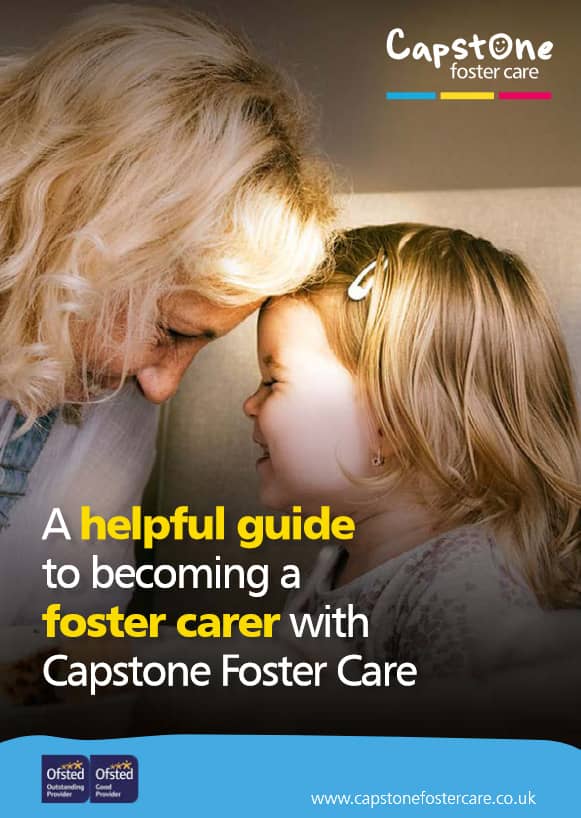


Fostering a disabled child
The role of an independent fostering agency
How to choose a foster care agency
Can I choose who I foster?
What are the benefits of fostering with an independent fostering agency?
What happens when a child is taken into care?
Fostering process: what happens on an initial home visit?
Fostering with local authority vs independent agency
A complete guide to becoming a foster carer
How Are Children in Foster Care Matched with Carers?
Foster Care Budgeting Tips
Becoming A Foster Carer
What is a Care Leaver?
What is a Foster Carer?
Fostering Regulations
How long does it take to become a Foster Carer?
What are the Foster Care requirements?
Changing IFA - Transferring to Capstone
8 reasons why a child may be taken into care
Fostering as a Career
Can you foster if you smoke or vape?
A guide to fostering assessments
LGBTQ+ Fostering
Equality, Inclusion & Anti-discriminatory Practice in Foster Care
What can disqualify you from foster care?
Can you foster if you’re on benefits?
Top transferable job skills to become a foster carer
Fostering as a same sex couple
Fostering while renting
Can you foster if you have mental health issues?
Is there an age limit for fostering in the UK?
Do foster carers get a pension?
How to foster a child: A step by step guide
How do DBS Checks Work?
Can I foster if...?
Mythbusting the top 10 Foster Care Myths
Can I foster if I am disabled?
LGBT Fostering Mythbusting
Can I foster if I have pets?
Can I Foster A Child?
Can I Foster and Work?
Can you Foster with a Criminal Record
Can Single People Foster?
LGBT Family and Foster Care
Fostering across Cultures
Muslim Fostering
Christian Foster Care
Sikh Fostering
Empty Nest Syndrome and Foster Care
Can I Foster?
What is the difference between residential care and foster care?
Fostering Babies and Young Children
What is Kinship Care?
Fostering Babies - Myths
Focusing on Parent & Child Fostering
Fostering Siblings
Fostering Teenagers
Fostering Teenagers - Breaking down the Myths
Fostering Unaccompanied and Asylum Seeking Children
Mother and Baby Foster Placements
Private Fostering
How does therapeutic fostering work?
Young Children Fostering Placements
Difference between short and long-term fostering
Types of self-harm
A Guide to the Foster Care Handbook
Reunification and Birth Parents: A Guide for Foster Carers
What is an EHC Plan? A Guide for Foster Carers
How to prepare a child for becoming a care leaver
Children who foster: impact of fostering on birth children
Fostering LGBTQ+ Youth
How to prepare your home for a foster child
How to help a lonely child: A Guide for Foster Carers
What are the National Minimum Standards for Fostering Services?
10 tips for foster children's education
How to prepare your foster child for secondary school
Tips for coping when foster placements end
Tips for foster parents during Coronavirus
What happens if foster parents get divorced?
5 ways to manage Mother's Day with foster children
Tips for managing foster children's bedtime routines
How to handle foster child bullying
Fostering allowances and the gender pay gap
What discounts can foster carers get?
How to adopt from Foster Care
5 ways to manage Father's Day for children in foster care
8 most common fostering challenges
FosterTalk Membership with Capstone Foster Care
Supporting foster children's contact with birth families
A guide to independent fostering
Keeping Children Safe Online: A Guide For Foster Carers
Movies About Foster Care
Play-based learning strategies for foster carers
A Guide to the Staying Put Program
Why Foster Parent Wellbeing Matters
How to deal with empty nest syndrome
How to recognise signs of depression in foster children
Can you take a foster child on holiday?
Tips and advice on fostering with a disability
10 tips on connecting with your Foster Child
Fostering vs Adoption - What's the difference?
How Fostering can change a future
How to adopt from Foster Care
How to encourage children to read in Foster Care
How to prepare a Foster Child's bedroom
Reading and Storytelling with Babies and Young Children
Supporting Children's Learning
The 20 most recommended books Foster Carers and young people should read
Things you can do when your children leave home
The impact of early childhood traumas on adolescence and adulthood
Anxious Disorders in Foster Children
What is sexual abuse and sexual violence
Foster Child behaviour management strategies
Foster Parent Advice: What to expect in your first year of fostering
Capstone's twelve tips at Christmas
10 celebrities who grew up in Foster Care
Could Millenials be the solution to the Foster Care crisis?
Do you work in Emergency Services?
Form F Assessor and Assessment Training
Foster Care Fortnight
Improving Children's Welfare - Celebrating Universal Children's Day
New Year - New Career - Become a Foster Carer
Young People Charities
The NSPCC (National Society for the Protection of Cruelty to Children) estimates that up to half a million children each year suffer a form of abuse. This can have a devastating effect on the child’s development, and has lasting effects throughout adolescence and into adulthood. Children may suffer abuse such as physical, sexual, emotional, neglect or they may witness their caregivers receiving similar kinds of abuse. When a child is young, any perceived threat to the safety of themselves or their primary caregiver can cause a child to feel very frightened and scared. This can have a long-lasting effect on a child through to adolescence and adulthood.
Common reactions in adolescence to childhood traumas can include experiencing strong and overwhelming emotions such as sadness, anger, anxiety and guilt. Often this can affect a teenager to feel unable to cope on a day to day basis. Due to this a teenager may turn to destructive coping methods; this can include self-harm, drinking alcohol or using illicit substances.
Other reactions a teenager may experience are withdrawing from their family and friends. This can lead to them becoming isolated and spending a lot of time alone. A teenager may also experience disturbed sleep patterns, a loss of appetite or a loss of interest in things they once enjoyed. A teenager may also portray a pessimistic outlook on life. Sometimes this can lead to an adolescence becoming clinically depressed and requiring treatment. If you care for an adolescent who you think may be depressed, then please seek treatment from the appropriate health care provider in your local area.
In serious cases, a child or young adult may develop PTSD (post-traumatic stress disorder). PTSD is an anxiety disorder cause by distressing and traumatic events. A person suffering from PTSD generally relieves the traumatic events through flashbacks and nightmare. This can lead to them feeling isolated, misunderstood, irritable and sometimes guilty. To be diagnosed with PTSD the symptoms must have a significant effect on a person’s daily life. It is estimated that 1 in 3 people who witness a traumatic events will develop PTSD – this can be immediately, or months/ years later. If you care for an adolescent who you think may be experiencing symptoms of PTSD then please seek medical advice from the appropriate health care provider in your local area.
It is important to remember that not every child who has suffered a traumatic event will experience emotional or mental health difficulties later on in life. Victim Support estimate that over 50% of people abused or traumatised as a young child will display symptoms lasting into adulthood. However, if you are caring for a child or adolescent who is displaying any signs or symptoms mentioned above that they can be treated and start/continue to live a happy and fulfilling life. It is paramount that a child or adolescent feels safe and loved by their primary caregiver. You can provide this security and love, along with professional help if required. Treatments can come in the form of psychological therapy such as counselling, CBT (cognitive behaviour therapy), DBT (dialectical behaviour therapy). Medication can also be provided in some instances if this is required. Childhood abuse can also lead to poor physical health in adulthood – it is important to get checked out at your local GP, hospital or dentist.
Child Welfare Information Gateway www.childwelfare.gov
National Health Service www.nhs.uk
National Society for the Prevention of Cruelty to Children www.nspcc.org.uk
The National Child Traumatic Stress Network www.nctsn.org
Victim Support www.victimsupport.org.uk
If you’ve got any questions or would like to find out more about fostering with Capstone, fill out the form below.
An experienced fostering advisor from your local area will then be in touch.

Start the conversation today. Our team of friendly advisors are on hand to answer any foster care questions you may have. We can offer you honest and practical advice that can help you decide if becoming a foster carer is the right path for you.


